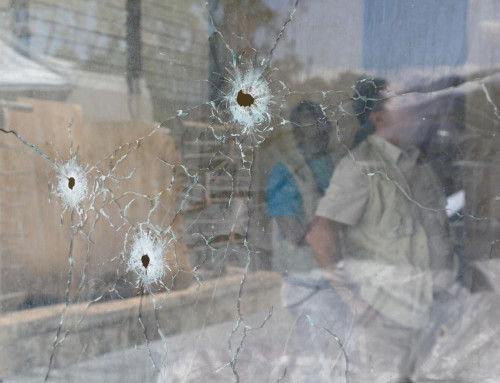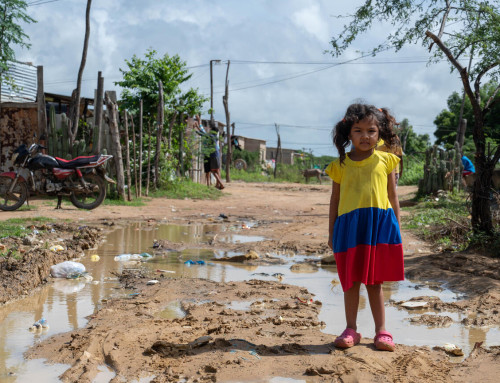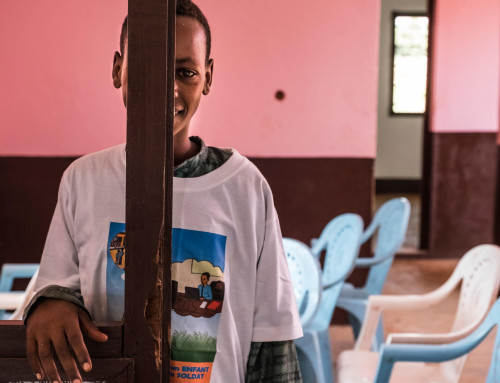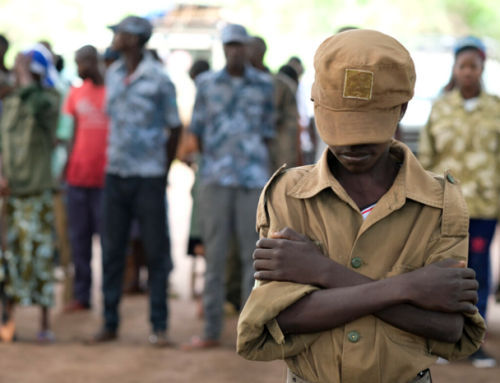Joint statement by Margot Wallström , Minister for Foreign Affairs of Sweden and Leila Zerrougui , Special Representative of the Secretary-General for Children and Armed Conflict
Throughout the world hundreds of thousands of children go to sleep each night, not with their favourite teddybear or doll beside them, but with a gun.
When they close their eyes, they do not replay the happy and innocent memories of their day, but instead fight to keep from their minds the horrors they have seen that day. There is no loving parent to tuck them in; indeed, many shudder at the sound of footsteps approaching their bed. This is the experience of child soldiers around the world.
These boys and girls are made to fight on the frontlines, forced to be suicide bombers in markets and schools. They serve as forced brides, or spies behind enemy lines, as cooks and porters in support of war efforts. Recruitment and use of children often results in severe physical and psychological trauma, which persist even after the conflict has ended. This practice is also inextricably linked with other violations against children in conflict, such as abductions, sexual violence and attacks on schools.
Around the world, nearly 250 million children are living in countries affected by conflict and tens of thousands of them have been recruited and used as child soldiers. Despite this reality, we are making progress in ending this horiffic and cruel practice, which robs children of their futures.
Today, as we mark the International Day Against the Use of Child Soldiers, which is also the 15th anniversary of the entry into force of a treaty to ban the recruitment and use of children in armed conflict, we also celebrate a remarkable achievement by the global community and the United Nations. We have finally reached a global agreement among Member States that children under the age of 18 should never be recruited and used in armed conflict. As of 2016, every national armed force identified by the Secretary-General as using child soldiers is working with the United Nations to end this practice. This is a development of major significance that is opening new doors to address the suffering of children in times of war.
Since 2000, over 115,000 children have been released from armed forces and groups. This shows the power of the UN and member states working together to give back a future to those who thought they had been abandoned.
The way forward
Despite this progress, the scale and intensity of today’s conflicts is stretching our capacity to protect children to its limits. In war zones, such as Syria, South Sudan, Iraq and Yemen, we are witnessing a deeply troubling breakdown in humanity and a decreasing respect for human life and human dignity. Children are being placed at the heart of conflict and directly targeted, with their homes and schools destroyed and food and water supplies deliberately cut off.
The most effective way to protect children is by preventing and resolving conflict and sustaining peace. This must be our priority. The international community has to find better ways to leverage influence on parties to conflict and to illustrate the enormous costs of war, both on the future of children and their communities. When peace processes begin, we must systematically include child protection from the outset. Addressing these challenges is key to building sustainable peace.
When prevention and conflict resolution fail, it is more important than ever to ensure effective use of the tools created by the United Nations, and particularly by the Security Council. Maintaining strong monitoring and reporting on violations against children is a prerequisite to informed action. The Security Council working group on children and armed conflict, created in 2005 and currently chaired by Sweden, has an important role to play in ensuring that timely and reliable information on the impact of armed conflict on children guides the broader work of the Security Council.
Sweden will do its utmost to ensure that the working group fulfils its task to deliver tangible results for boys and girls affected by armed conflict. As chair, Sweden will proactively engage with countries, especially those who have shown a willingness to address these issues and who need our support. We will also work with regional organisations. It is our joint responsibility to make sure that children affected by war are given a voice and a hope for a better future.
Finally, the reintegration of former child soldiers must be a strong focus of our efforts. These children are rarely given the appropriate support to re-join their communities, often due to a lack of adequate resources to provide the immediate and longer term support these children need. We must be more persuasive in encouraging governments, including donors, of the importance of this investment to help communities rebuild following conflict. It is a crucial final piece of the puzzle to ensure a sustainable peace.
The childhood we envision for our own sons and daughters is often a distant dream for children growing up in war zones. However, it does not need to be so. On this International Day Against the Use of Child Soldiers, we renew our commitment to do everything in our power to protect children affected by armed conflicts and to help them recover. We have come a long way. Let us use this momentum to turn the page once and for all on the recruitment and use of children in conflict.
This statement was also published in Swedish Foreign Policy News
For additional information, please contact:
Stephanie Tremblay, Communications Officer, Office of the Special Representative of the Secretary-General for Children and Armed Conflict, +1-212-963-8285 (office), +1-917-288-5791 (mobile), tremblay@un.org





